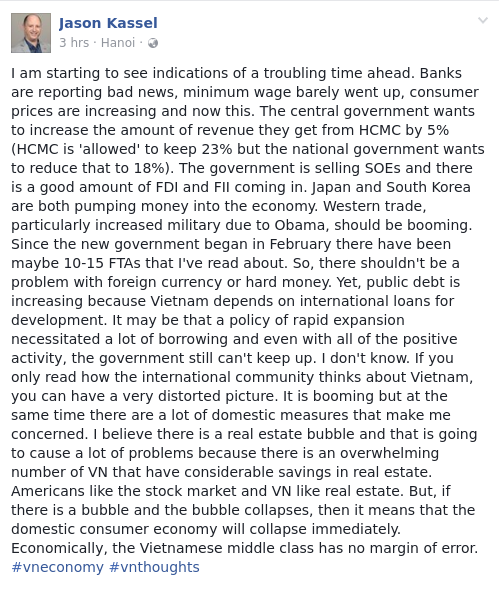[ESSAYS BY JACOB GADIKIAN] Startups in Vietnam: Is economic standardization appropriate?
Does mirroring another nation's economic policy result in the creation of the same set of problems?
"Startups in Vietnam"
An essay by Jacob Gadikian

In response to:

So it is this unnamed uncertainty, more than anything else that led me out of Hanoi. Oh, and some indirect exposure to "locked in capital value" on the real estate markets didn't help either. TBH though, if we look at the whole thing and shine a light on it, shake it around some and try to figure out what happened, or is happening, I end up reaching the conclusion that the current situation is the result of three things:
A) Near universal expectation of strong growth due to TPP.
Of course, TPP is a set of promises the USA is not at all prepared to deliver on, what with our election in progress. One presidential candidate is against it, and one presidential candidate has a public position and a private position, for sharing with wall street. In two years in Vietnam, I never did find a wall street. What I'm saying here is that the election (and the fact that there's a I mean OMFG-- the emails: She's a felon a dozen times over! Oh, and on the other side, there's a guy that Jane Goodall said was basically an ape, oh, and he's like kinda linked to all kinds of far-right craziness-- plus, I'm sure anyone could find a little more than a little tax fraud if they looked right.
TPP should have been great for Vietnam, but American foriegn policy isn't what it used to be. Oh, wait, it never was much to write home about, now was it?
Oh, and I'm sure that TPP or anticipation of it is helping someone.....
B) TPP (to use a loaded phrase) "rigs the system" in favor of incumbents and / or multinationals. There are some Vietnamese multinationals doing very, very well if I recall correctly.
VN has been shaping its economy to comply with TPP even though it may not be ratified on the US side. What this has done is this: it gave VN an economy more like that of the United States. Sorry, I wasn't referring to the size of the thing, mind you, I'm referring to the problem-set. C'mon how many of you have noticed that FPT runs half the "startups" directly, and via funding acquires a majority stake in many more?
That is an American problem to have.
C) Strange AF Back-room deals
Strange, it would seem that we have this difficulty in the United States, as well:
Look no further than the dinosaur weddings:
- AOL+TW (1999) There were other dinosaur weddings that year, as well.
2016: Yahoo + Verizon. Stagnation will never catalyze stagnation and make it growth. Now there's a bigger, slowly sinking ship.
2016: Time Warner + ATT
The network providers of yore will soon be no more. What we're witnessing is a gradual transition of networks to two types: government owned, centralized and community operated, decentralized. What many seem to not realize is that the real growth in ISPs will surely be in the kinds of neighborhood-oriented schemes that these days tend to deliver 10gbps. Every ISP that cannot compete with 10GBPS straight to the home for sixty-to-a hundred bucks a month is in jeopardy. The only way that this beast could make money, seemingly, is by using its lobbying pool to further constrain independents in both the Fiber, Cable,and LTE delivery categories, which these days are all just IP anyway.
So, was that a strange AF backroom deal? You bet! Why's it strange AF especially compared with oh, I don't know -- building better networks?
It's strange because it only makes sense if you were in that backroom.
My point here is that the United States does not have a largely free economy. It has an economy tightly regulated by the very firms that it claims to be regulating to benefit the people. Trouble is, regulation almost never benefits people, AND that the US proclaims to be a very free economy.
.....meanwhile, the trouble for Vietnam is that they've adopted many american-style practices and will likely never get the promised trading environment.
The true worker's paradise is a stateless nation that places its administration in the hands of a formal set of procedures recorded into an impartial blockchain system. The true worker's paradise makes rules that apply equally and automatically to all, and the true worker's paradise would never develop the ability to shape the economy and society by distorting the economy. Yes, more than any other industry out there , the government industry needs to be eaten by software. If it is good software, for a better society, it would never enable the creation of policies that constrain users. Instead, good software focuses on enabling users to achieve everything possible, equally.
What I'm saying here, loudly and clearly, is that passive governance is best for all. It's time we start to think of government as another set of software standards, and to develop those standards. And once we do that, ensure that localities set the rules for each place (No federal anything-- the law is most applicable and relevant on a LOCAL level) we can have change.
More on this in my next article. Also, readers should note that we are currently
valuable information congratulations
Included in Steemprentice Spotlight :)
Tweeted by SteemLand
While I don't know much about VN's economy, my instinct tells me you are fairly accurate in your analysis. The TPP is not gonna be good for anyone but the oligarchs and transnationals. Something in your last two paragraphs brought Tron, and the MCP to mind. Scary shit.